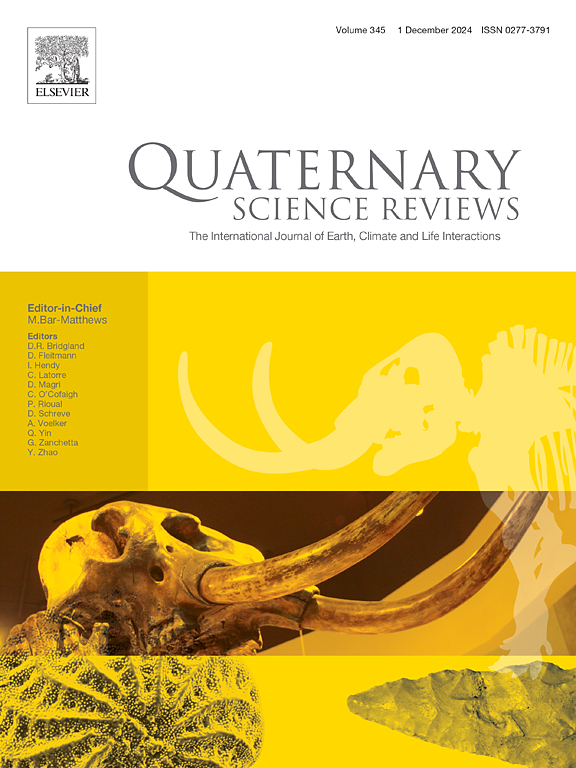潘诺尼亚盆地第四纪氨基地层学:深岩心物质中时间、埋藏深度和温度的相互影响
IF 3.2
1区 地球科学
Q1 GEOGRAPHY, PHYSICAL
引用次数: 0
摘要
第四纪气候变化的长期陆地档案说明了全球变化是如何影响区域气候的,但由于缺乏用于放射性测年的材料,将陆地沉积物与全球记录进行关联可能具有挑战性。潘诺尼亚盆地(匈牙利)包含大河流域,其第四纪沉积物的深度接近 600 米。这项研究利用双疣蜗牛厣对氨基酸地质年代学的 IcPD(结晶内蛋白质降解)方法进行了测试,以确定地温较高地区深层岩芯材料的年代。从 Körös 盆地、Jászság 盆地、Makó 海槽和 Békés 盆地等四个次区域的七个全芯钻孔中采集了材料。IcPD 随着年龄的增长而增加,直到大约 230 万年前,总体上支持了之前在钻孔之间进行的地层关联。同一次区域内不同钻孔的 IcPD 是一致的。然而,由于该地区地热梯度陡峭,沉积速率不同的子区域之间的 IcPD 存在系统性差异。埋藏较深的同等年龄样本的 IcPD 水平较高,表明地热效应较大。这让我们了解了埋藏温度的变化如何影响深埋(80 米)化石中蛋白质的分解,并证明了了解地热环境对氨基酸地质年代的重要性。这项研究显示了 IcPD 对更新世陆地深层岩心沉积物相关性的实用性。本文章由计算机程序翻译,如有差异,请以英文原文为准。
A Quaternary aminostratigraphy for the Pannonian Basin: The competing influences of time, burial depth and temperature in deep-core material
Long-term terrestrial archives of Quaternary climate change illustrate how global changes affect regional climates, but correlation of terrestrial deposits to global records can be challenging due to a lack of material for radiometric dating. The Pannonian Basin (Hungary) contains large river basins, with near-continuous Quaternary deposits ∼600 m in depth. This study tested the IcPD (intra-crystalline protein degradation) approach to amino acid geochronology using bithyniid snail opercula to date deep-core material in geothermally warm regions. Material from seven fully-cored boreholes was collected from four sub-regions: the Körös and Jászság basins, Makó Trough and Békés Basin. IcPD increased with age until approximately 2.3 million years ago, generally supporting stratigraphic correlations previously made between the boreholes. IcPD was consistent between different boreholes within the same sub-region. However due to the steep geothermal gradient in this region, IcPD was systematically different between sub-regions that had different sedimentation rates. Equivalently aged samples buried more deeply had higher IcPD levels, indicating a greater geothermic effect. This provides an insight into how variations in burial temperature can affect protein decomposition within a deeply-buried (>80 m) fossil over geological time, and demonstrates the importance of understanding the geothermal setting for amino acid geochronology. This study shows the utility of IcPD to correlate terrestrial deep-core sediments over the Pleistocene.
求助全文
通过发布文献求助,成功后即可免费获取论文全文。
去求助
来源期刊

Quaternary Science Reviews
地学-地球科学综合
CiteScore
7.50
自引率
15.00%
发文量
388
审稿时长
3 months
期刊介绍:
Quaternary Science Reviews caters for all aspects of Quaternary science, and includes, for example, geology, geomorphology, geography, archaeology, soil science, palaeobotany, palaeontology, palaeoclimatology and the full range of applicable dating methods. The dividing line between what constitutes the review paper and one which contains new original data is not easy to establish, so QSR also publishes papers with new data especially if these perform a review function. All the Quaternary sciences are changing rapidly and subject to re-evaluation as the pace of discovery quickens; thus the diverse but comprehensive role of Quaternary Science Reviews keeps readers abreast of the wider issues relating to new developments in the field.
 求助内容:
求助内容: 应助结果提醒方式:
应助结果提醒方式:


